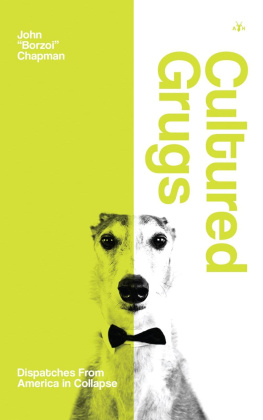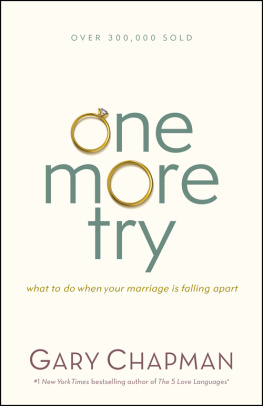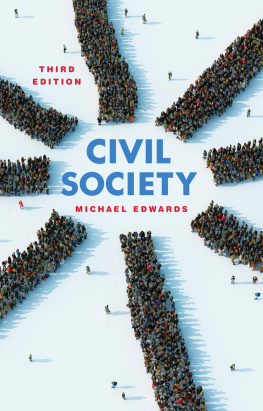First published 2009 by Transaction Publishers
Published 2017 by Routledge
2 Park Square, Milton Park, Abingdon, Oxon OX14 4RN
711 Third Avenue, New York, NY 10017, USA
Routledge is an imprint of the Taylor & Francis Group, an informa business
Copyright Taylor & Francis.
All rights reserved. No part of this book may be reprinted or reproduced or utilised in any form or by any electronic, mechanical, or other means, now known or hereafter invented, including photocopying and recording, or in any information storage or retrieval system, without permission in writing from the publishers.
Notice:
Product or corporate names may be trademarks or registered trademarks, and are used only for identification and explanation without intent to infringe.
Library of Congress Catalog Number: 2007021923
Library of Congress Cataloging-in-Publication Data
Voluntary associations / [edited by] J. Roland Pennock and John W. Chapman
Originally published: New York : Atherton Press, 1969.
Includes bibliographical references.
ISBN 978-1-4128-0565-0
1. Associations, institutions, etc. 2. Pluralism (Social sciences). I. Pennock, J. Roland (James Roland), 1906- II. Chapman, John William, 1923-
HM711.V65 2007
302.301dc22
2007021923
ISBN 13: 978-1-4128-0565-0 (pbk)
With this volume, the Nomos series enters its second decade. No over-all plan directs the Societys choice of topics from year to year. We rely instead on intimations, as Michael Oakeshott would say. Notice that the first ten years of meetings, and the resulting volumes of Nomos, have dealt with many of the central concepts of political and legal philosophy. The Society has considered authority and revolution, justice and equality, community and liberty, the public interest and rational decision, responsibility and representation. This book deals with a topic that serves, perhaps today above all others, to unite the thought and research of many political and legal philosophers, on the one hand, and empirically oriented social scientists, on the other.
Political scientists, joined recently by political sociologistswith bows to Arthur F. Bentley and Emile Durkheim, and to Harold J. Laski and other political pluralistshave been studying pressure groups for over half a century. Behavioral scientists, in particular sociologists and social psychologists, have begun to investigate group dynamics and those private associations that are especially voluntary in nature. Behind and inspiring these intensive efforts stand the majestic figures of Montesquieu and Tocqueville. Sometimes preceding and sometimes contemporaneously with the contributions of descriptive pluralism, the more normative pluralistsBosanquet and Follett, Lindsay and Barker, Hocking and MacIverhave steadily emphasized the importance of private and voluntary associations for the theory and practice of liberal democracy. They stand in a great tradition that runs from Aristotle through the Puritans and Locke, and on to Rousseau, Kant, and Hegel. Looking back on the past half century and more, it would seem that without being fully aware of each other the descriptive and normative pluralists have been refining and elaborating the political theory of pluralism. Now new concepts, such as system and feedback, are offering promise of improved theoretical and empirical unifications. Accordingly, it is altogether fitting, interested as the Society is in intellectual mutuality and collaboration, that this volume of Nomos should be devoted generally to the political and legal aspects of private and voluntary associations, to a philosophical analysis of their nature, and to their operational significance for social and political pluralism.
Some words of explanation and justification are in order to prepare the reader for what lies ahead. The title of the meetings of the American Society for Political and Legal Philosophy from which this book issues was Private Associations. During our discussions it soon became apparent that the implied dichotomy was unsatisfactory, that the conceptual ground had been shifting under our feet. For the line between the private and the public has become blurred throughout the modern polity, and new conceptions, with a medieval ring like estate, or an ultra modern tone, technostructure, are crowding in upon us. Some of the new concepts have the flavor of the market about them, such as partisan mutual adjustment. We hear of quasipublic-quasiprivate corporations, of highly organized associations and organized pluralism. Rather strange looking at first sight. Organized association smacks of tautology, and organized pluralism seems almost self-contradictory. But in fact these concepts are admirably precise for dealing with a world that is becoming quasipublic-quasiprivate, inhabited by estates and technostructures, and run in part by processes of partisan mutual adjustment.
In search of an escape from the fading dichotomy of private and public, the editors decided to substitute the apparently more firm concept of voluntary. And we instructed the contributors who wrote specifically for the volume to this effect. Very quickly it became clear that voluntary suffers also from the disease that afflicts private. Any association by definition has at least an element of voluntariness. And voluntariness, like privacy, is becoming more and more a matter of degree. Moreover, there are both historical and analytic dimensions to the meaning of voluntary. Political philosophers are inclined to use voluntary association to cover all those private activities that enter into the composition and operation of a plural society. Political and behavioral scientists tend to restrict the concept to the kinds of private organizations in which the presence of consent and spontaneity is pronounced. In these changing conceptual lights we have sometimes allowed the old terminology to stand, where that seemed the best way to convey the intended meaning. In other cases, with the authors consent, we have altered the original text of papers prepared for the meetings. We hope and trust that the results are at least not seriously confusing, although some measure of confusion there is bound to be.
The theory of voluntary association and political pluralism has been advancing rapidly and is being extended and applied in various and important ways. New theoretical vistas offer a perspective in which the contributions to Nomos XI can be located and appreciated. Of course, no single volume can begin to deal with all the issues that arise in the theory and practice of pluralism. Our wish is only to add somewhat to the momentum already so visible throughout political philosophy and social science. We thank the contributors for their participation; to Harry Jones, Cardozo Professor of Jurisprudence at the Law School of Columbia University, we are especially indebted for organizing the meetings in which this enterprise began.
J. ROLAND PENNOCK
JOHN W. CHAPMAN







